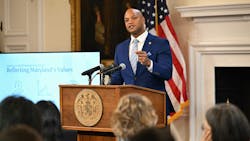Maryland to add $150 million to shore up proposed cuts in FY25 transportation budget
Maryland Department of Transportation (MDOT) received a one-time injection of $150 million from Maryland Gov. Wes Moore, who included the additional general funds in his proposed Fiscal Year 2025 Budget. The funding will restore proposed cuts to MDOT’s Final Fiscal Year 2024 – 2029 Capital Program and follows input from stakeholders and communities on how proposed cuts to the program would impact them.
In December, MDOT released its proposed six-year spending plan that included steep cuts to operating and capital budgets to help bridge a $3.3 billion deficit. At the time of the proposal’s release, MDOT Secretary Paul J. Wiedefeld explained the department’s expenses were expected to increase seven percent annually while revenue was only expected to increase by one percent.
While the proposed six-year program included funding for major projects such as the Purple Line and the Frederick Douglass Tunnel, Maryland Transit Administration’s (MTA) operational funding was reduced by eight percent and its capital funding was reduced by approximately three percent. The six-year plan also proposed delaying or cancelling funding for bus upgrades, state of good repair projects and delaying the transition to zero-emission buses.
Gov. Moore’s office says the proposed funding will enable restoration of previously planned reductions to MDOT's budget for one year and will continue to drive the Moore-Miller Administration's commitment to building more equitable and sustainable prospects for economic growth and mobility forward.
“This is a season of discipline and our choices must reflect our priorities. Our budget helps grow our economy and our transportation budget is essential to that mission," said Gov. Moore. “By providing a critical funding bridge, we're helping Maryland's working families continue to have access to places where they work, places where they learn and other essential destinations. We appreciate the partnership and leadership shown by so many on the local level who worked with us to make their concerns heard."
More than half of the funding will go to restore proposed cuts to the Maryland Transit Administration (MTA), including $26 million restored to fund Locally Operated Transit System grants, $28 million to maintain MTA commuter bus service, $15 million for MTA state of good repair needs and $8 million in MARC Brunswick Line operating resources to maintain service frequencies to West Virginia and to launch a new mid-day service pilot.
In addition to the MTA program funding restoration, the one-time funds will support:
- $52 million to fully restore Highway User Revenue funding
- $10 million in State Highway Administration highway mowing and litter removal funding
- $5 million in MDOT-wide information technology and cybersecurity upgrades
- $4 million in Motor Vehicle Administration operating dollars to maintain branch hours and keep open limited service branches
- $2 million in Maryland Aviation Administration priority contractual services to retain key operations at BWI Thurgood Marshall Airport.
“Thanks to Gov. Moore's leadership, we will be able to restore funding for next year to some of our most vital transportation services," said MDOT Secretary Wiedefeld. “These resources will benefit Marylanders in rural, urban and suburban areas, making sure that MDOT is able to provide for the residents who depend on these programs the most."
About the Author

Mischa Wanek-Libman
Group Editorial Director
Mischa Wanek-Libman is director of communications with Transdev North America. She has more than 20 years of experience working in the transportation industry covering construction projects, engineering challenges, transit and rail operations and best practices.
Wanek-Libman has held top editorial positions at freight rail and public transportation business-to-business publications including as editor-in-chief and editorial director of Mass Transit from 2018-2024. She has been recognized for editorial excellence through her individual work, as well as for collaborative content.
She is an active member of the American Public Transportation Association's Marketing and Communications Committee and served 14 years as a Board Observer on the National Railroad Construction and Maintenance Association (NRC) Board of Directors.
She is a graduate of Drake University in Des Moines, Iowa, where she earned a Bachelor of Arts degree in Journalism and Mass Communication.
